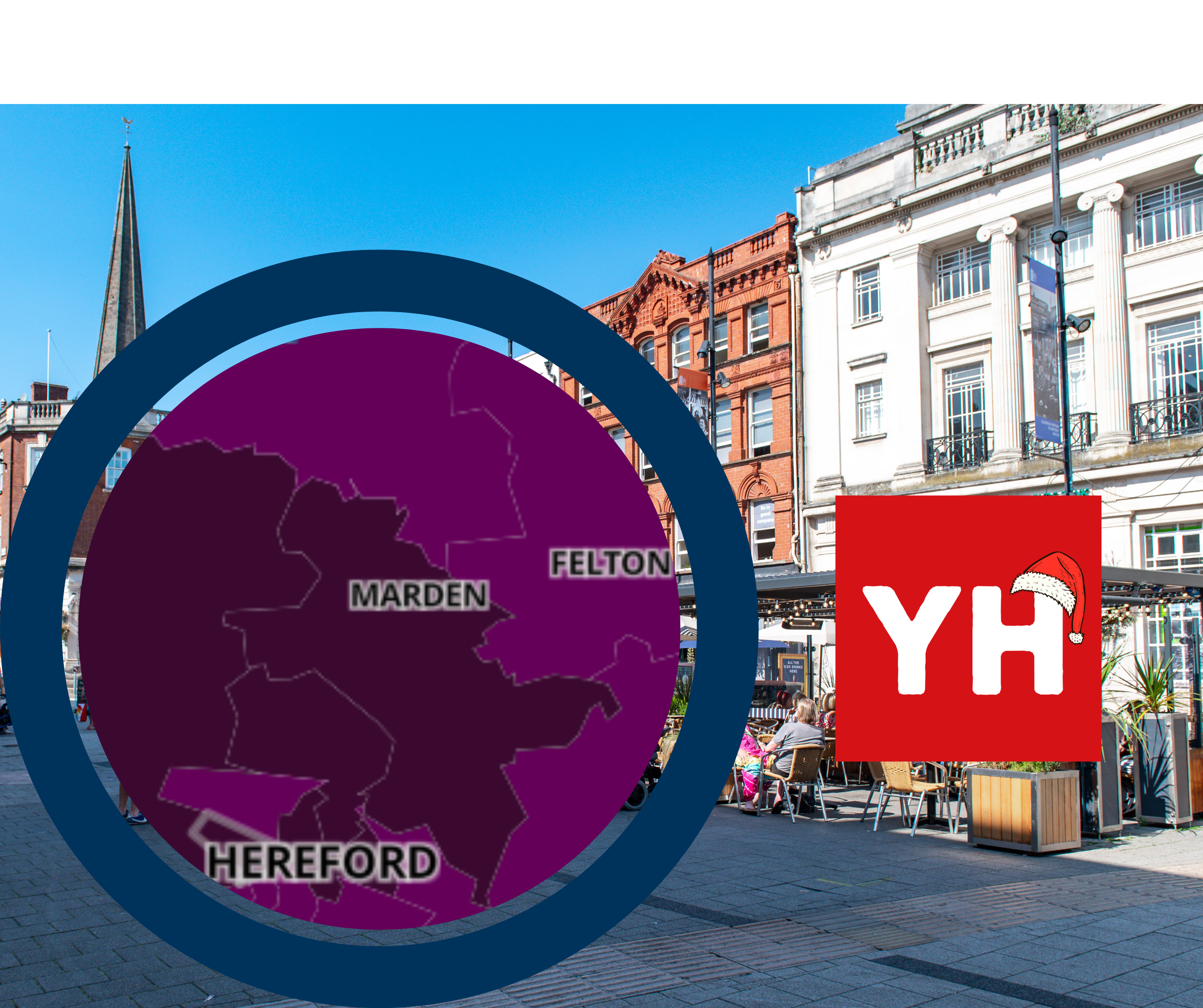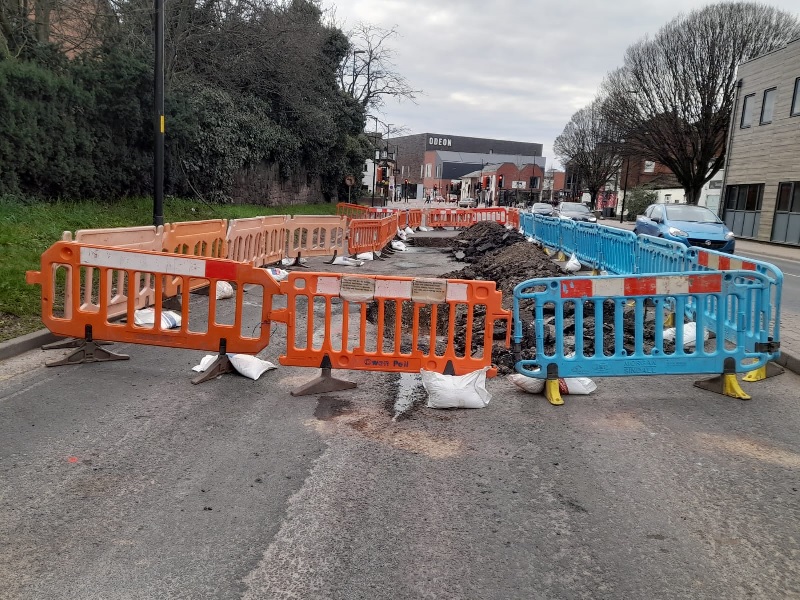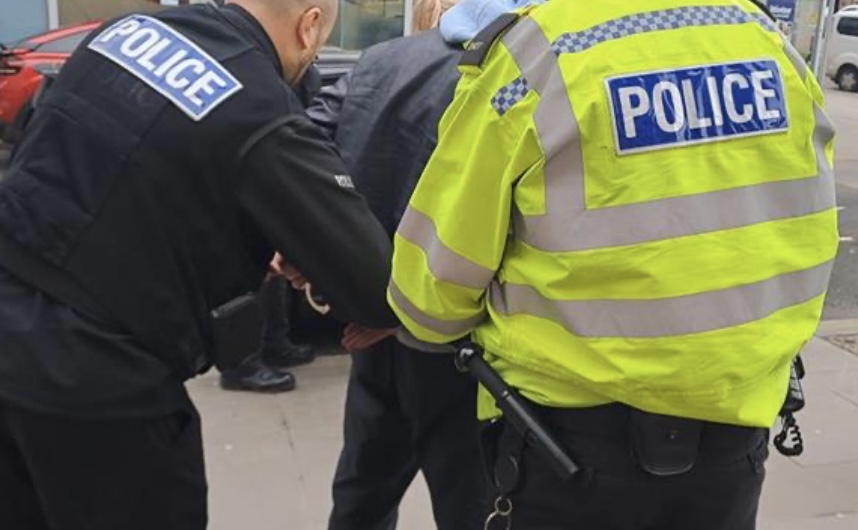Latest data released by Public Health England shows that COVID-19 cases are continuing to rapidly rise in Herefordshire, with six areas of the county now recording ‘very high’ levels of infection. In the seven day period ending 26th December, a total of 1341 new cases of COVID-19 were recorded in Herefordshire, giving a COVID-19 infection rate of 692.6 cases per 100,000 population.
The areas of Herefordshire with the highest COVID-19 infection rates are:
Hereford East: 1,244.7 cases per 100,000 population (Increase of 184.6% on previous seven day period)
Hereford Central: 887.2 cases per 100,000 population (Increase of 52.5% on previous seven day period)
Hereford North East: 1,148.6 cases per 100,000 population (Increase of 152.8% on previous seven day period)
Lugwardine, Withington & Moreton on Lugg: 906 cases per 100,000 population (Increase of 38.5% on previous seven day period)
Credenhill, Weobley & Wellington: 879.5 cases per 100,000 population (Increase of 88.9% on previous seven day period)
Hereford West: 1,120.8 cases per 100,000 population (Increase of 131.4% on previous seven day period)
All adults in England offered COVID-19 booster vaccine
Every eligible adult in England has now had the chance to get a life-saving COVID-19 booster, as the government and NHS hits their target to offer the top-up jab to those aged 18 and over by the New Year.
On 30 November, the government set out its ambition to offer all eligible adults the chance to get their top-up jab by the end of January. In response to the emerging threat of the Omicron variant, the target was brought forward by the Prime Minister and the NHS through the national Get Boosted Now campaign, to protect the public as quickly as possible – with the aim of offering all eligible adults a booster by the New Year.
The campaign led to a huge increase in vaccination rates, with over 8 million top-up jabs administered in just over 2 weeks in England (a 45% increase), between 12 December when the Prime Minister set out the new ambition and yesterday (Thursday 30 December). The NHS in England has broken record after record in that time – including the highest number of vaccinations ever recorded in a single day: 830,000 top-ups reported on Saturday 18 December. This was also the day the UK hit over one million vaccinations in total, including first, second, third and booster doses – jumping from 928,000 the previous day.
More than 28.1 million people in England – more than 7 in 10 of eligible adults – have now had their booster following the rapid expansion of the vaccination programme over the last month. This includes around 90% of those aged 50 and over who are eligible.
The COVID-19 booster vaccination programme has been a historic national effort for both the NHS and the public, with tens of thousands of volunteers stepping up to support NHS staff and thousands of people queuing up to secure the protection for themselves and others. This week, the NHS ensured over 1.5 million appointments were still available between 27 December and 3 January, allowing anyone eligible who hadn’t yet had the booster the opportunity to book their appointment. For anyone who hasn’t yet come forward, hundreds of thousands of appointments remain available to book between now and Monday 3 January with millions more slots available beyond 3 January.
Health and Social Care Secretary Sajid Javid said:
Our world-leading vaccination programme has meant tens of millions of people have been able to see their loved ones this Christmas knowing they have the protection of the booster.
I am delighted to confirm we have hit our target of offering a COVID-19 booster to all adults by the New Year.
I am incredibly proud of the work the NHS has done to accelerate the programme and offer my thanks to the frontline staff, volunteers, Armed Forces and British public who have made it possible for us to meet this commitment.
Some eligible people may not have been able to receive their booster yet due to catching COVID-19, as the majority will be required to wait 28 days following infection before receiving a booster.
To meet the ambitious target and ensure the country was offered protection against the new variant, the COVID-19 vaccination programme was accelerated and scaled up significantly over the past month. This included:
- opening over 3,000 vaccination sites, with 180 new sites having opened in December – including at football stadiums, shopping centres and at Christmas markets, with extended opening hours and some sites working around the clock
- sending over 30 million people invites from the NHS during 2021 – including over 3.9 million letters, 26.7 million text messages and 14.7 million emails inviting people to book online
- sending a text to everyone in the country urging them to get boosted
- drafting in 750 armed forces personnel to support deployment, alongside a renewed drive that has meant the recruitment of tens of thousands of volunteers
- temporarily suspending the 15-minute observation period following Pfizer or Moderna booster jabs, where clinically safe and appropriate to do so, in order to get more jabs in arms
Dr Emily Lawson, head of the NHS COVID-19 vaccination programme, said:
I am hugely grateful for the extraordinary efforts of NHS staff and volunteers this year, who have gone above and beyond to roll out the NHS vaccination programme and who, in just over 12 months, have administered more than 110 million life-saving COVID-19 jabs.
It is thanks to their tireless efforts that 28 million people have also received their vital booster jab since September, and countless records have been broken in recent weeks as the biggest and most successful drive in health history accelerated the booster rollout and offered all adults the opportunity to book their top-up dose.
With COVID-19 cases continuing to rise rapidly, the best resolution you can make this new year is to protect yourself and those around you, so I urge you to come forward for your booster as soon as you can, and with hundreds of thousands of appointments available in the coming days, it has never been easier to grab your jab.
The dose interval between the second dose and booster dose was also reduced from 6 months to 3 months on the advice of the independent Joint Committee on Vaccination and Immunisation (JCVI) – with booking made available one month in advance.
The UK’s booster programme is one of the fastest in the world, as the second country in Europe – after Iceland – and third in the world for the number of boosters per 100 people in the total population. 33.5 million top-up jabs have been administered in the UK in total, as well as 51.7 million first and 47.4 million second doses.
This follows a record festive period of vaccinations in England. Vaccinators were working at sites up and down the country to give people their boosters over Christmas. More than 214,000 jabs were reported across Christmas Eve, Christmas Day and Boxing Day, including 184,445 boosters.
There were 306,574 vaccinations on Tuesday 28 December (including 258,399 boosters) – the highest bank holiday total recorded – and 244,078 vaccinations on Monday 27 December (including 209,626 boosters).
All eligible adults can get the jab by booking online through the National Booking Service or by visiting their nearest walk-in vaccination centre.
Vaccines Minister Maggie Throup said:
We have now offered all eligible adults in England a COVID-19 booster – a triumph for the NHS and the vaccination programme.
It’s never been easier to get your vaccine, with over 3,000 vaccination sites now open – so you can grab a jab in between shopping the January sales or watching your favourite football team play.
Hundreds of thousands of appointments are available between now and 3 January – book your booster now to play a part in the fight against Omicron ahead of the New Year.
While 2 doses of a COVID-19 vaccine provides strong protection against the Delta variant, data from the UK Health Security Agency (UKHSA) shows 2 doses is not enough to protect people from Omicron – but a third dose provides around 70% protection against symptomatic infection from Omicron 2 to 4 weeks after the booster is given.
It is vital to get a first and second jab, in order to be eligible for a booster to get the vital protection against Omicron. Recent UKHSA data shows people who are unvaccinated are up to 8 times more likely to be hospitalised than those who are fully vaccinated.
If someone has contracted COVID-19 and has not yet received their booster, after 28 days have passed they are encouraged to book their jab as soon as they can.
Those eligible for a booster vaccine who have delayed making an appointment because of other acute illnesses are also encourage to book as soon as they are fully recovered.




